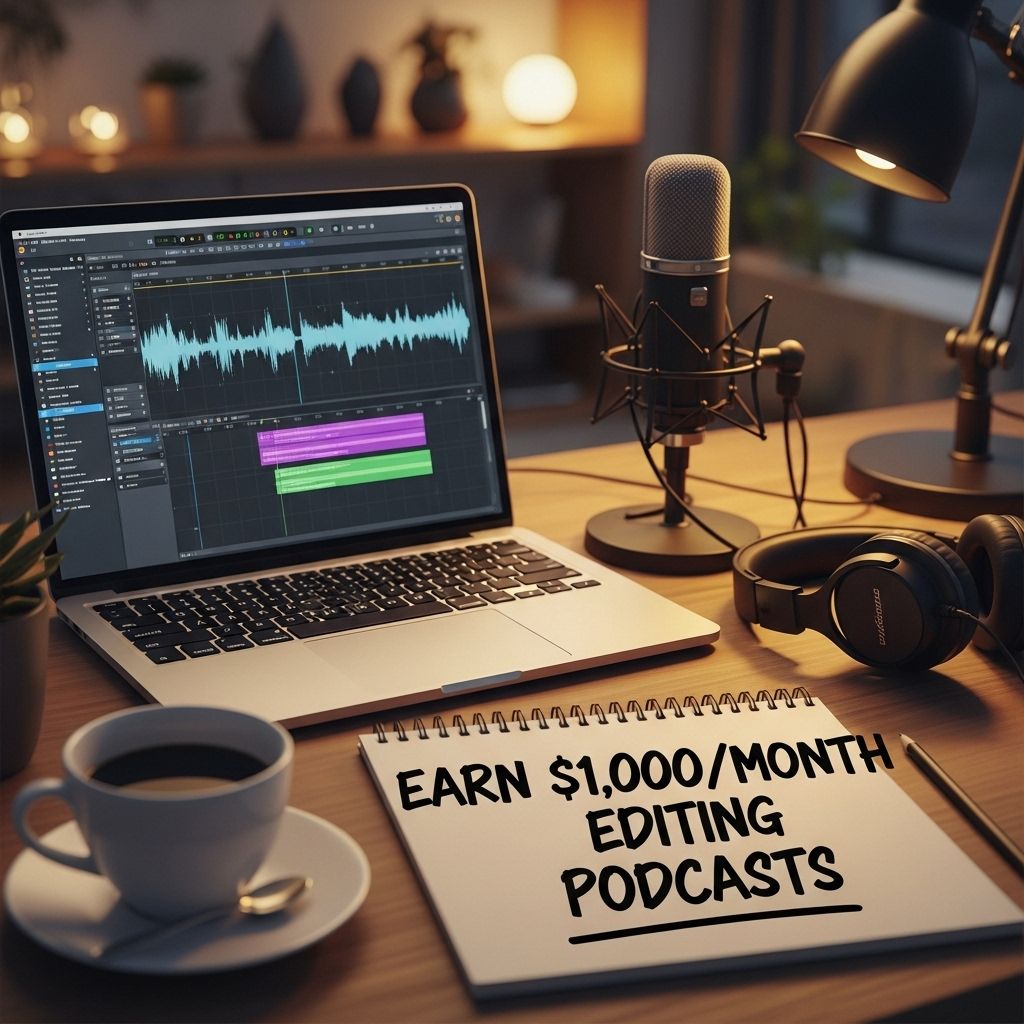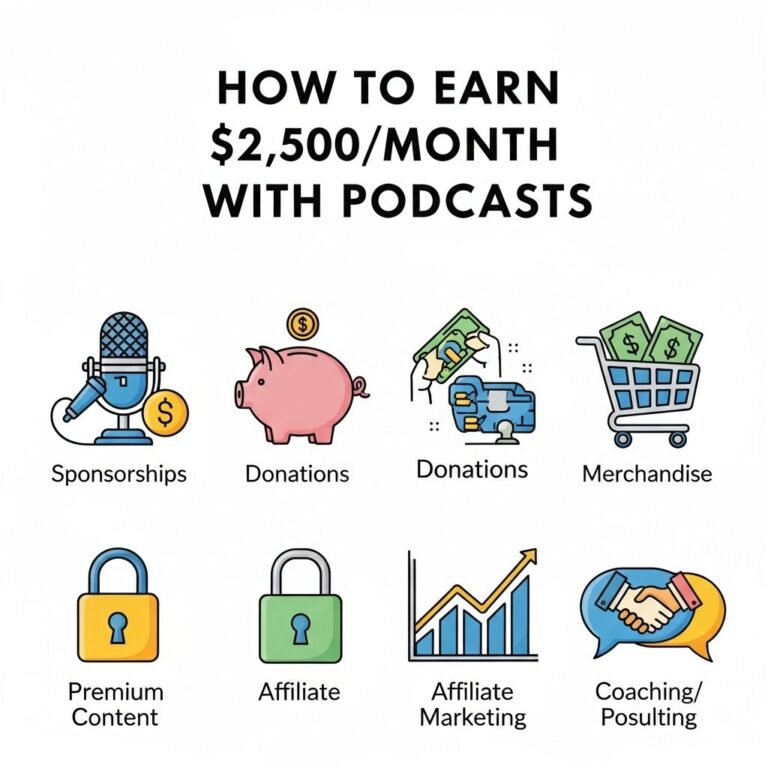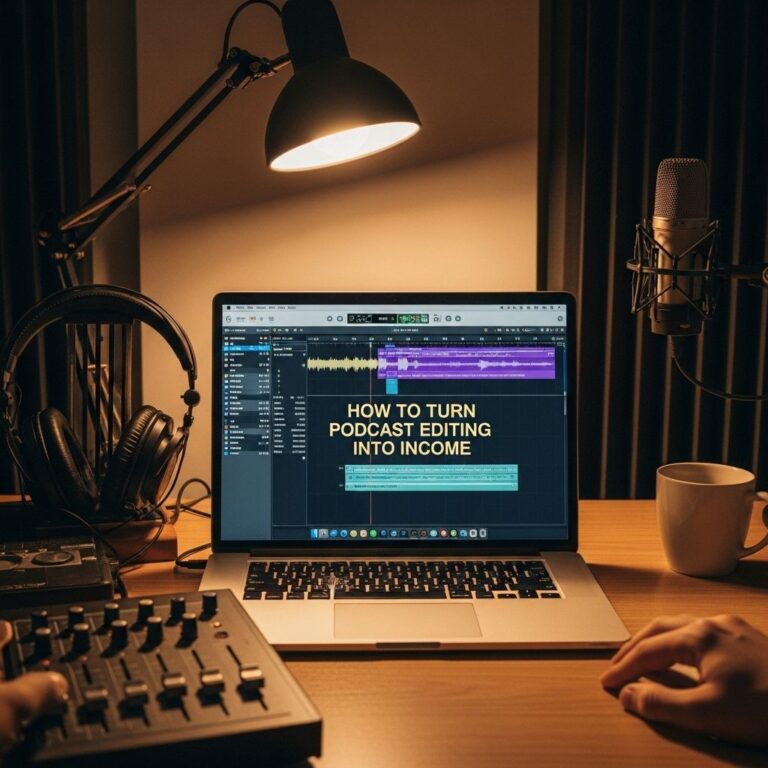In an age where podcasts have surged to the forefront of digital content consumption, opportunities for tech-savvy individuals have multiplied. Editing podcasts not only offers a creative outlet but also a pathway to earning a substantial income. With the right skills and tools, you can turn your passion for audio editing into a lucrative side hustle or even a full-time job. But how exactly do you earn $1,000 a month from editing podcasts? Let’s explore this captivating journey.
Table of Contents
The Rise of Podcasts
Before diving into the mechanics of podcast editing, it’s essential to understand the landscape of the podcasting world. As of 2023, there are over 2 million podcasts available, with millions of episodes catering to a broad range of interests and topics.
Key Statistics
- Podcasts reach over 100 million listeners weekly.
- 67 million Americans are monthly podcast listeners.
- 89% of podcast listeners listen to all or most of each episode.
These figures highlight the immense potential for content creators and editors alike. With a growing number of podcasters entering the market, the demand for skilled editors is rising as well.
Essential Skills for Podcast Editing
To effectively edit podcasts, you need a mix of technical skills and a good ear for sound. Here are some essential skills that will set you apart from the competition:
Technical Proficiency
- Audio Editing Software: Familiarize yourself with popular software like Adobe Audition, Audacity, or GarageBand.
- Sound Design: Understanding sound effects, background music, and how they enhance storytelling.
- Audio Quality: Knowledge of noise reduction, equalization, and mastering techniques.
Creative Skills
- Storytelling: Knowing how to weave narrative elements together for better engagement.
- Attention to Detail: Catching inconsistencies and ensuring a polished final product.
- Communication: Working with clients to understand their vision and provide feedback.
Getting Started as a Podcast Editor
Now that you understand the skills needed, let’s break down how to launch your podcast editing career step by step.
1. Build Your Portfolio
Start by editing a few episodes of your own podcast or offering free services to friends or local creators. This will help you gain experience and create a portfolio to showcase your work.
2. Set Up Your Workspace
Invest in quality equipment and software to ensure you can deliver high-quality edits. A recommended setup includes:
| Item | Recommended Option |
|---|---|
| Microphone | Audio-Technica AT2020 |
| Headphones | Sony MDR-7506 |
| Audio Interface | Focusrite Scarlett 2i2 |
| Editing Software | Adobe Audition |
3. Market Your Services
Create a professional website or a profile on freelance platforms like Fiverr or Upwork. Highlight your skills with samples from your portfolio. Promote your services on social media and within podcasting communities.
Pricing Your Services
Strategies for Pricing
Determining how to charge for your editing services can be tricky. Here are some strategies to help you set competitive yet fair prices:
- Per Episode Rate: Charge a flat fee for each episode based on its length and complexity.
- Hourly Rate: Offer an hourly rate for editing, typically ranging from $25 to $100 per hour depending on experience.
- Package Deals: Create packages for clients who want ongoing support (e.g., 4 episodes per month for a discounted rate).
Maximizing Your Earnings
To reach the goal of $1,000 a month, here are some effective strategies:
1. Diversify Your Client Base
Work with different podcasters across various genres. This not only helps you learn and grow but also increases your income potential. Consider niche markets that might need specialized editing.
2. Upsell Additional Services
Besides basic editing, you can offer additional services, such as:
- Audio Restoration
- Sound Design and Music Composition
- Creating Show Notes and Transcripts
3. Build Long-term Relationships
Focus on establishing long-term contracts with clients. This ensures stable income and helps you become a go-to professional for their podcasting needs.
Common Challenges and Solutions
Like any freelance work, podcast editing comes with its challenges. Here are some common issues and how to tackle them:
1. Client Expectations
Clients may have different visions for their podcasts. Communicate clearly and set expectations from the start to avoid misunderstandings.
2. Time Management
Balancing multiple projects can be overwhelming. Use project management tools like Trello or Asana to keep track of deadlines and tasks.
3. Staying Updated
The podcasting landscape is always evolving. Stay informed about new trends, technologies, and editing techniques through online courses, webinars, and networking with other professionals.
Conclusion
If you leverage your editing skills wisely and approach podcast editing with creativity and dedication, earning $1,000 a month is not just possible; it’s very achievable. By continuously improving your craft, building a solid clientele, and adapting to the evolving industry, you can create a rewarding career in the thriving world of podcasts.
FAQ
How can I start earning $1,000 a month by editing podcasts?
To start earning $1,000 a month editing podcasts, you can offer your services on freelance platforms, network with podcasters, and build a portfolio showcasing your editing skills. Set competitive pricing and consider working with multiple clients to reach your income goal.
What skills do I need to become a podcast editor?
Essential skills for podcast editing include proficiency in audio editing software (like Audacity or Adobe Audition), a good ear for audio quality, attention to detail, and the ability to meet deadlines. Basic knowledge of sound design can also be beneficial.
How much should I charge for podcast editing services?
Podcast editing rates can vary widely, but a common range is between $25 to $100 per hour, depending on your experience and the complexity of the work. Some editors charge per episode, with rates ranging from $50 to $300 based on length and editing needs.
Where can I find clients for my podcast editing services?
You can find clients for your podcast editing services on freelance job platforms like Upwork and Fiverr, social media groups dedicated to podcasting, and by networking at podcast events or through online communities.
What is the typical workflow for podcast editing?
The typical workflow for podcast editing includes receiving raw audio files, listening to the content, cutting out mistakes or awkward pauses, adding music or sound effects, balancing audio levels, and exporting the final product in the desired format.
Can I edit podcasts remotely and still earn a good income?
Yes, you can edit podcasts remotely and still earn a good income. Many podcasters work with remote editors, allowing for flexible work arrangements and the potential for a diverse clientele from around the world.








